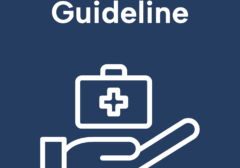Recent Research on EMDR Therapy
Eye Movement Desensitization and Reprocessing (EMDR) therapy is backed by extensive research, proving its effectiveness for trauma-related conditions and psychological disorders. Below, explore the latest research findings that make EMDR a leading therapeutic approach.
Treatment Guidelines
EMDR therapy is recommended as a first-line treatment for PTSD and other trauma-related disorders in the treatment guidelines of top health organizations, including International Society for Traumatic Stress Studies (ISTSS), World Health Organization (WHO), American Psychological Association (APA), and Department of Veterans Affairs/Department of Defense VA/DoD.
Treatment guidelines are systematically developed recommendations that guide healthcare providers in making decisions about the care of specific health conditions. These guidelines are built on rigorous research and reflect expert consensus on EMDR's effectiveness.
View more treatment guidelines in the EMDRIA Library.
Randomized Controlled Trials (RCTs)
Randomized Controlled Trials (RCTs) are considered the gold standard for clinical research. Participants are randomly assigned to either a treatment group (e.g., receiving EMDR) or a control group (e.g., receiving no treatment or a different therapy). This method minimizes bias and helps establish the effectiveness and safety of an intervention.
EMDR therapy has been extensively studied using this methodology. These studies demonstrate EMDR’s efficacy and safety for a range of conditions and across diverse populations.
View more RCTs in the EMDRIA Library.
Meta-Analyses & Systematic Reviews
Meta-analyses and systematic reviews provide high-level evidence by synthesizing results from multiple studies. Together, they give a clearer picture of EMDR’s effectiveness.
- Systematic Reviews: These reviews summarize research on a specific topic related to EMDR, often comparing its outcomes to other trauma-focused therapies, such as CBT.
- Meta-Analyses: These use statistical techniques to combine data from multiple studies, producing an overall effect size to measure EMDR’s impact.
View more meta-analyses/systematic reviews in the EMDRIA Library.
Peer-Reviewed Articles
Beyond PTSD, researchers continue to investigate EMDR’s potential for addressing various psychological and physical health conditions. Peer-reviewed studies reveal promising outcomes in areas such as treatment-resistant depression, specific phobias, anxiety and panic disorders, emotional regulation, as well as how EMDR can be adapted for specific populations, including children, survivors of natural disasters, individuals with complex trauma histories, and much more.
View more peer-reviewed articles in the EMDRIA Library.
Continue Your Research
This page provides an overview of recently published, peer-reviewed research on EMDR therapy. For even more resources—including videos, infographics, and courses — please explore the EMDRIA Library’s curated collections.
Page updated: March 2025





